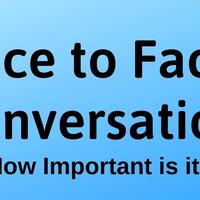Face to Face Conversation: How Important is it in Language Learning?
Hi there, Steve Kaufmann here back in Vancouver. The weather is nice. It's a little cooler than Palm Springs. Today I want to talk about the importance of face-to-face contact in language learning and the reason for that is I had an exchange on Twitter. I made some comment about language learning and a teacher came on and said there's too much emphasis on technology. The most important thing is face-to-face contact in the classroom.
I disagree. I think that face-to-face contact as a part of language learning is relatively unimportant. I think language learning is a much more individual activity. Obviously, when you are reading you are not making face-to-face contact with anyone. When I am listening to my mp3 player I'm not making face-to-face contact. If I'm studying at LingQ I'm not making face-to-face contact. If I'm watching movies I'm not making face-to-face contact. There are so many things that you can do as an individual. Forget LingQ, you can go down to the library and borrow free of charge a wide range of learning materials for whatever language you're learning. So much of what is needed in order to acquire a language relies on you the learner, relies on you doing things on your own, things that you find interesting and the face-to-face contact becomes a reward in a way. It's kind of like the goal. Obviously, at some point in my Arabic learning I want to be in situations where I am in face-to-face contact with Arabic-speaking people. I can converse and enjoy that whole experience, but there is so much work that I have to put in on my own before that in order that this face-to-face contact is going to be meaningful, enjoyable and so forth.
You can have face-to-face contact in a classroom and, in fact, the sort of language content, the target language, the language you're learning, the intensity of that language environment could be quite low. It could be that the teacher is explaining something. It could be that you're listening to other students who speak the language very poorly. I much prefer hearing the pure language, hearing stories, hearing things of interest in the language or reading and getting used to the language. The language is not something that's going to be taught or explained and then you've got it. Aha, now I understand. Now I can speak the language.
To learn a language requires so much exposure. It's a slow, gradual process of allowing your brain to get used to a different way of expressing things, different structures, different words and this requires a lot of time with you the learner and the language you're learning not in some face-to-face or even these conversation clubs and so forth. In Japan, for example, the eikawa have a little group that speaks English. That's not going to do it because, again, in these eikawa where we have five or six Japanese people and a foreign native speaker speaking they're using a very limited range of vocabulary. And, of course, the intensity of that language exposure is not as high as listening, reading and acquiring words.
Now, as I've always said, at some point you have to start speaking and you have to start speaking a lot and you have to start using the words that you have acquired, at the very least to hear them in some meaningful context in an exchange with someone, but that comes later on. It can start early, but it becomes a bigger and bigger part of your language learning later on. Initially, there's this major investment to be made by the individual. I think someone once said oh, reading is very asocial and I like interacting with people, I like face to face and this teacher was saying the same thing in the little Twitter exchange we had. Actually, it's not antisocial to read. You are interacting with thoughts, you are interacting with words, you are interacting with the language and all of this is helping you to get used to the language.
So the idea that somehow you have to have this face-to-face contact, face-to-face contact with a teacher, at some point can be useful. It's not inexpensive to organize. It's far better to put a lot of effort into things that are less expensive and build up your capability so that when you have the face-to-face exchange you can really take advantage of it. I should add that face to face needn't actually be face to face. I just did a lesson through Skype with one of our LingQ members, an English lesson and we didn't have our video on. We just spoke and it was like a telephone conversation through Skype. Maybe you focus better on the words sometimes when you actually don't see the other person's face. Not that I'm against seeing people's faces. At some point yeah, we definitely want to have face-to-face encounters with people, but it's not a key to learning the language. So that's really what I wanted to say about the importance of face-to-face contact as a part of your language learning strategy. It's a part of it. It needn't be a major part of it. It's certainly not a condition of learning the language.

